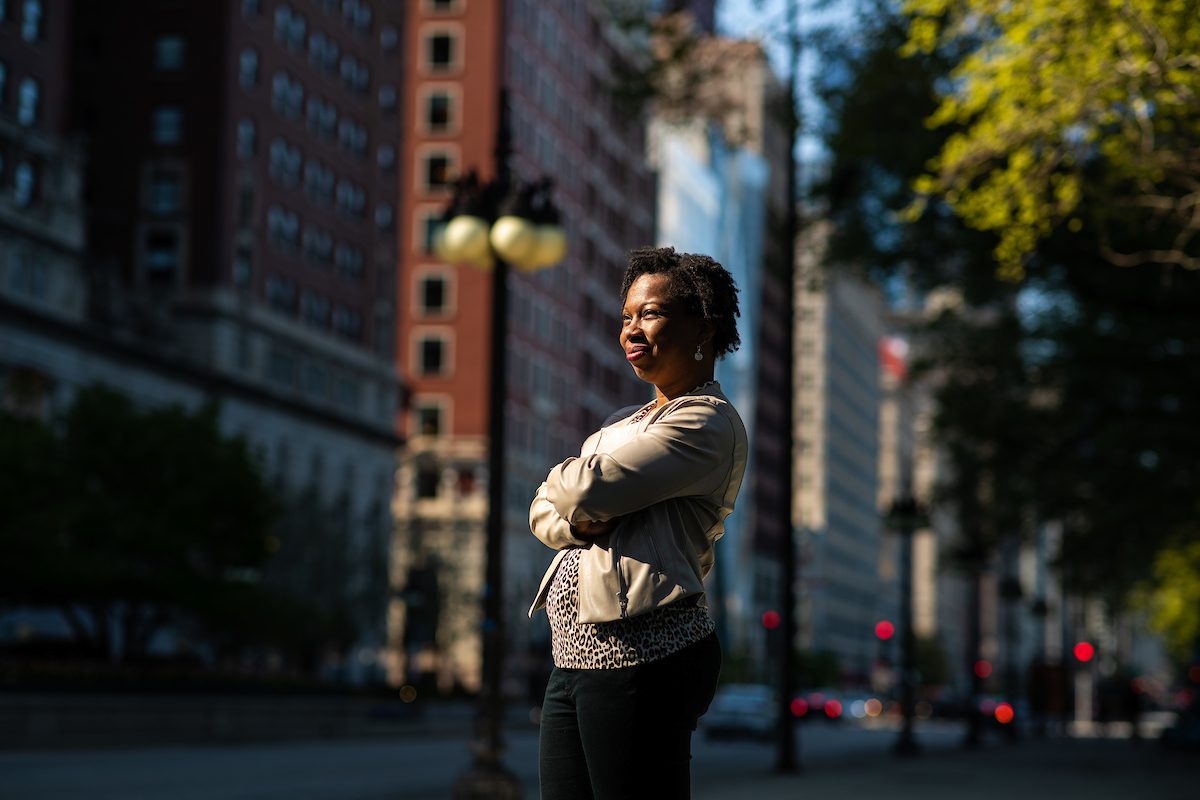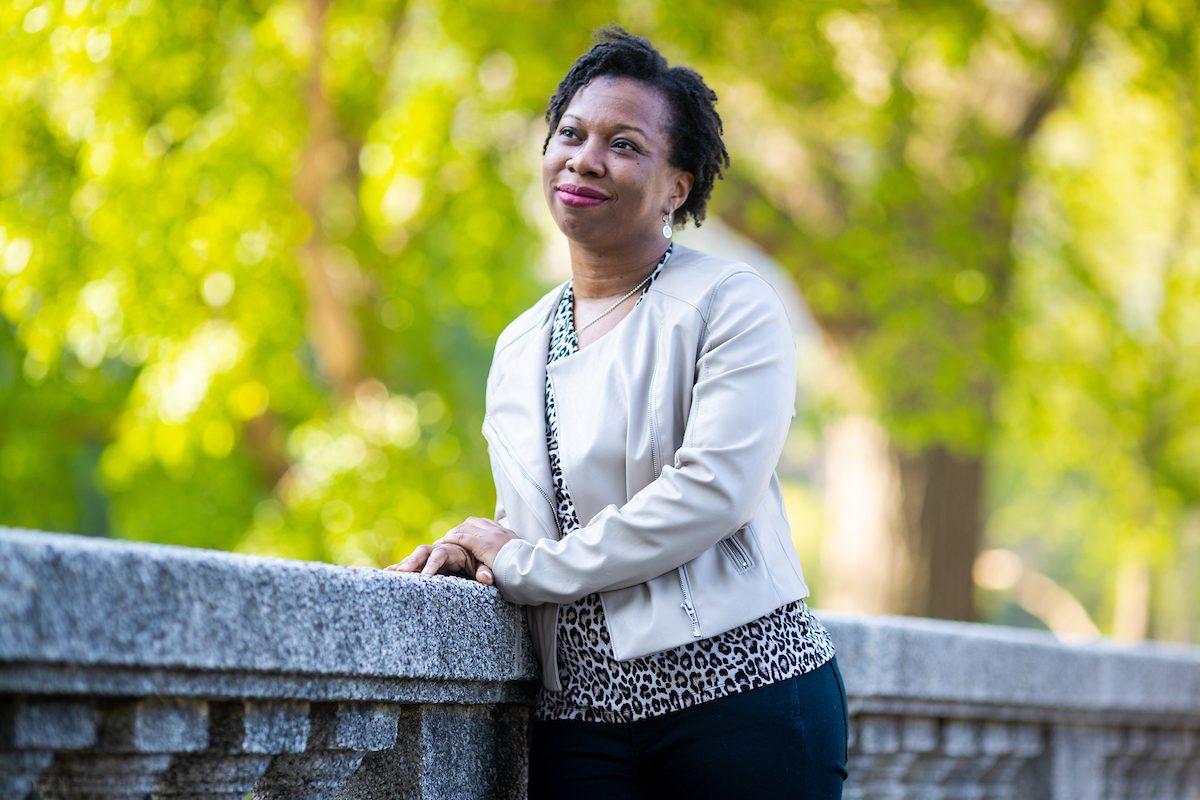The corporate gamechangers
Loyola's Baumhart Scholars are transforming business to be a driver of social change.

As a Black woman in the advertising industry, Shalane Walker (MBA ’22) saw firsthand the discrepancy in ad sales between the legendary Ebony and Jet magazines and their white counterparts like Vogue and Cosmopolitan. Ebony and Jet were central in African American culture and media for decades. Walker grew up reading them in the 90s, and so did her parents decades earlier. But without the competitive ad sales, the magazines struggled. Their owner filed for bankruptcy, sold the publications and iconic photo archives, and discontinued their print editions.
It seemed, Walker thought, that this was simply how business worked. “At the time, I was 24 or 25 and thought, ‘I can’t change the rates; they’re pre-negotiated,’” she says. “This is just the way it is.”
But these days, Walker has changed her tune when it comes to accepting the status quo. The shift came when Walker started studying in the Baumhart Scholars MBA program at Loyola University Chicago’s Quinlan School of Business. The program is facilitated by Quinlan’s Baumhart Center for Social Enterprise and Responsibility—named for Loyola’s longest serving president, the late Raymond Baumhart, S.J.—which was founded in 2017 with the goal of transforming business to be a driver of social change. The Baumhart Scholars MBA program trains leaders like Walker to harness business tools for good and to work to solve business problems in new, innovative, and socially impactful ways.
In other words, Walker says, she’s learned to challenge the “it’s just the way it is” mindset. “Change,” she says, “starts with someone saying, ‘let’s do things differently.’”
We’re asking this fundamental question of can you teach business that is explicitly trying to build a more just, humane, and sustainable world?
— Seth Green , former director, Baumhart Center
Most businesses today operate under a shareholder model of capitalism, first popularized by Milton Friedman in the mid-20th century. Profit is the singular marker of success. The model has made way for CEOs like Amazon’s Jeff Bezos to earn billions every year while Amazon factory workers struggle to make ends meet. According to the Economic Policy Institute—a Washington D.C.-based nonprofit think tank focused on low- and middle-income Americans—in 2019, leaders of large corporations like Amazon made on average 320 times as much as their average worker (in 1989, it was only 61 times as much). In addition, diversity is almost nonexistent among Bezos’s peer group—only 37 women and a meager four Black CEOs lead Fortune 500 companies today—and negative impact on the environment is rarely weighed in evaluating the success of a business.
Loyola’s Baumhart Center champions the idea that business can—and should—do more than just put money in shareholder pockets. Using a stakeholder model, business could be designed in a way that benefits all the varied groups involved: the employees, the community, the customers, as well as the owners. Likewise, a company’s bottom line could be measured based on factors like sustainability, equity and inclusion, or community engagement—not just dollars made.
While there is an appetite for this type of thinking in the business world (a study done by Deloitte showed that 77 percent of business executives view social impact as critical to their company’s success), there’s an obvious hurdle. It would be difficult to convince current CEOs, who are bringing in big profits from the current model, to make a change that’s going to cost them personally. But what if new business leaders emerged from their MBA program with a different mindset?
“People come out of MBA programs and then influence their workplaces,” says Emily Nordquist (BBA ’16, MBA ’18), interim director of the Baumhart Center. Launched in 2019, the program is the first of its kind, taking a unique approach to teaching future business leaders. “We are reimagining business education so that the next generation of business leaders will have the business acumen to be future CEOs but they’ll also be thinking about everything with a purpose and equity lens.”
“We’re asking this fundamental question of can you teach business that is explicitly trying to build a more just, humane, and sustainable world?” adds Seth Green, the former director of the Baumhart Center who catapulted it into national prominence.

While learning the fundamentals in areas like accounting, finance, or supply chain management, Baumhart Scholars also learn about the real-world social implications that go along with these areas. In accounting, for example, students discuss how to account for humans’ impact on the environment. In marketing, they learn how to be respectful of DEI while running a successful campaign. The purpose and equity lens they develop in the classroom is then what they bring to decision-making in their workplaces, at companies like PepsiCo, Northern Trust, McDonalds, as well as nonprofits and government agencies.
The success of the program relies largely on its cohort model, bringing together scholars from different industries who can learn from one another and interpret the course material together. Students receive individualized mentorship from business leaders across the Chicagoland area, have access to a network of professionals pioneering these concepts in the real world, and are given generous scholarship support, something extremely rare for part-time MBA programs.
Regardless of their background, Baumhart Scholars are driven by their values and “are willing to walk through walls to build a better world,” says Green. And it’s no surprise that this type of MBA program was born at a Jesuit university like Loyola. “Jesuits want to set the world on fire,” says Green. “And that is kind of what [Baumhart Scholars] are trying to do in business.”
As media director at Wavemaker, a global media agency that is part of the GroupM and WPP advertising network, Walker uses the business tools she’s learned in the Baumhart Scholars MBA program to affect lasting change within her company. Long a passionate advocate for diversity, equity, and inclusion, Walker feels that her Loyola education has given her not only the why behind making socially conscious business decisions but the how in going about implementing them.
“I can say ‘if we make these changes to make our place more equitable, it actually will have a positive impact on our bottom line,’” Walker says. “But in order to have that conversation, I need to be able to know what the bottom line is and be able to read it.”
Recently, Walker created and implemented a mentorship program within her company, where C-suite level leaders mentor a mid-level person of color. The program helps builds connections between groups that may not have otherwise crossed paths. Walker’s mentor is her company’s chief operating officer. They meet regularly and have built a great relationship.
“It’s been amazing because that’s not access I would have had,” Walker says. “And that’s something that I’ll have for the rest of my life.”
Because of my background in building shared value and impacting social good, individuals truly value my unique perspective.
— Charity Driggs (BBA ’17, MBA ’21) , Baumhart Scholar
Likewise, Charity Driggs (BBA ’17, MBA ’21), a member of the inaugural cohort of the Baumhart Scholars MBA, has become a trusted thought leader at Morningstar, a global investment research firm. And it has come at a relatively early point in her career because of the vast knowledge she’s gained at Loyola. As associate product manager on Morningstar’s sustainability team, Driggs spearheaded the creation of the company’s first corporate sustainability report in 2020, which examined the firm’s current effort and set future goals to incorporate sustainability into their governance, workplace, and business operations.
“I was able to apply my learnings from class on how to gain feedback from all stakeholders, coordinate with leadership, and partner with different business units to advance and centralize firm sustainability efforts,” she says. “Because of my background in building shared value and impacting social good, individuals truly value my unique perspective.”

At a time when social issues like sustainability, racial justice, and gender equality are becoming more mainstream, the value of a Baumhart scholar’s skillset will only continue to grow. And as socially conscious business professionals like Driggs and Walker rise the ranks in their industries, business itself will begin to change.
“If you’re a traditional business leader and you don’t think it’s important to integrate diversity, equity, and inclusion and advocacy and allyship into your skillset, in the next decade, you will be a less valuable leader at your company,” Nordquist asserts. “There are going to be conversations happening that you do not know how to participate in, and you’re going to lack this lens for understanding how companies can actually integrate impact into every function of their work.”
The Baumhart Scholars MBA program offers a glimpse at what the future of business education could look like and hopes to serve as a model for other universities that see the value in using business for good. Today’s Baumhart Scholars will be tomorrow’s CEOs, and with that, business in the future could be more sustainable, more equitable, and more diverse.
“I tell people I want to be CEO,” Walker says, but it’s more than just an aspiration to lead an organization. “I want to be CEO so I can change the way we do the business.”
Read more stories from the Quinlan School of Business.